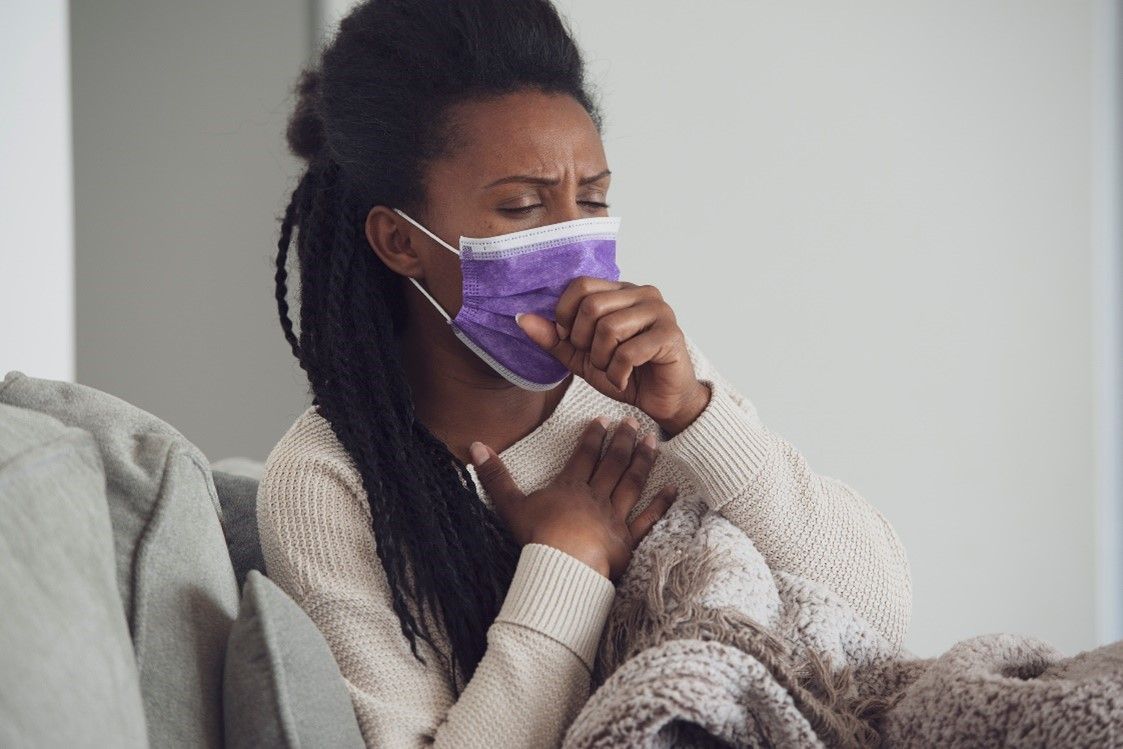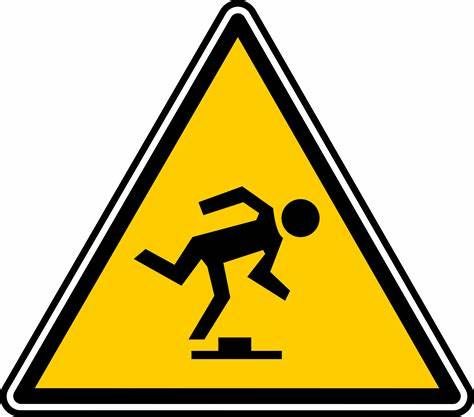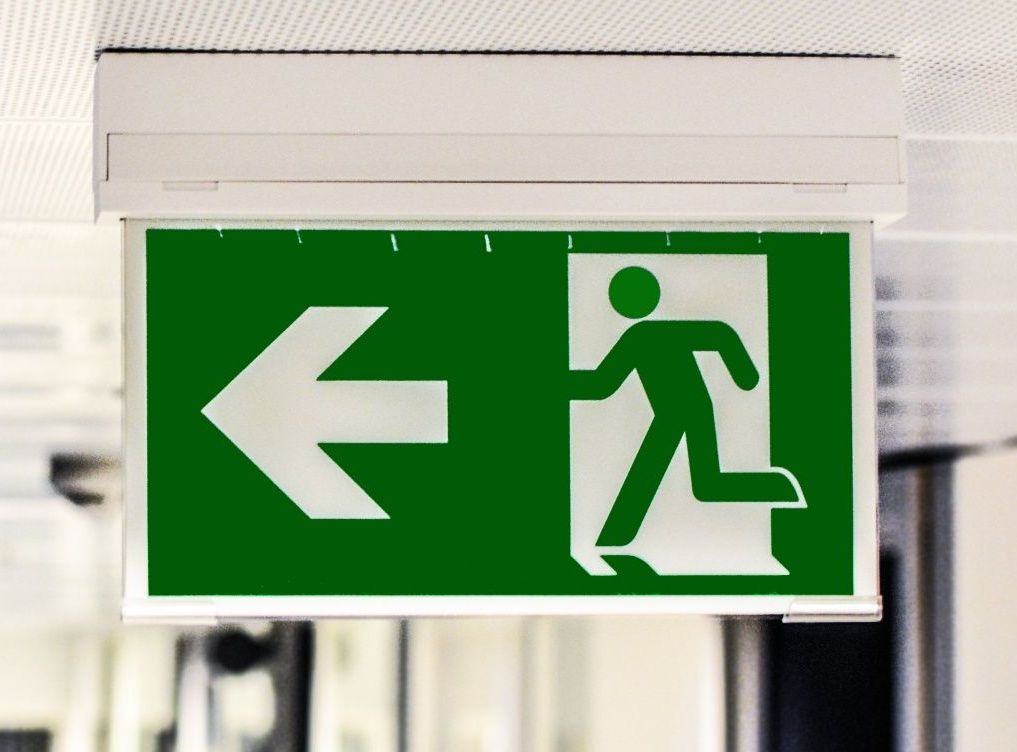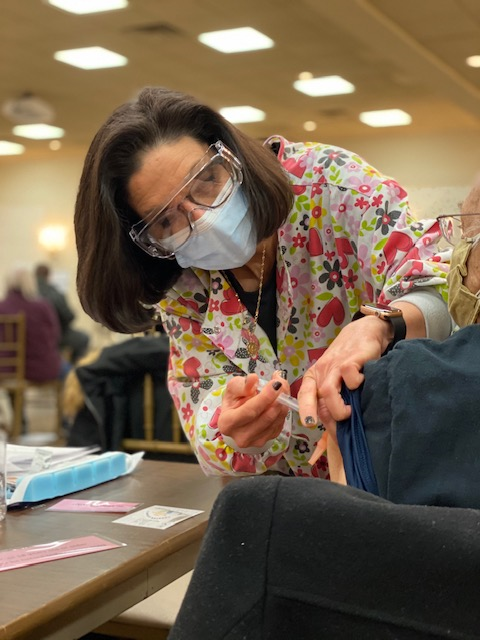CALL US TODAY 610-675-1111
A family owned business providing a full range of home health and school nursing services
Blog
Keeping Up with CritiCare

By Jessica Barnett
•
21 Mar, 2024
National Nutrition Month is an annual promotion every March started by the Academy of Nutrition and Dietetics in the United States. Like last month where we focused on Heart Health, this month is designated to hit on the importance of nutrition. Being a caregiver at CritiCare, you may be working with a patient who requires a special diet. Some clients may require this due to medical conditions or food allergies. It's crucial to always review the care plan before reporting to a case. Patients with certain medical problems may need to follow a more restrictive diet. Diabetes is an example of a medical condition where eating well can potentially prevent or delay health complications, according to The Center of Disease Control and Prevention. By following any medication/food schedules and keeping an eye on their blood sugar levels, you can help keep your client safe. Additionally, depending on the individual, he or she may have a certain calorie intake they must follow, or other specialized instructions. Being aware of your patients’ dietary restrictions will allow you to provide the best care for them throughout the day. Another possibility for patients is food allergies, so it's critical to regularly review the care plan to make sure you are aware of what foods to avoid. Since food allergies cannot be cured, it's important that you are ready for any allergic responses that may occur. In cases where food allergies are more severe, action plans for patients may be included in their care plans. A food allergy can cause symptoms such as hives, rash, difficulty breathing, or digestive problems, although each person's reaction is different.

By Jessica Barnett
•
01 Feb, 2024
February is the designated month to raise awareness about heart health and cardiovascular diseases. CritiCare Home Health and Nursing would like to take this time to educate our caregivers about heart disease prevention techniques, risk factors and healthy lifestyle choices. You can educate your patients on heart health by first learning about it yourself! You play a vital part in supporting your clients' heart health as a nurse and aide at CritiCare. Patients depend on us to help them and look to their caregivers for guidance frequently. The Centers for Disease Control states that leading a healthy lifestyle can lower blood pressure, blood cholesterol, and blood sugar levels, all of which can lessen your risk of heart disease. Making healthy habits is the first step towards maintaining a healthy lifestyle. You can start forming the following kinds of habits: Healthy Diet : Make a point of cutting back on processed foods and increasing fruit and vegetables in your diet. Additionally, cutting back on salt (sodium) can help lower blood pressure. It's important to make smart drink choices as well. Substitute alcohol and sugary drinks with water. Regular Exercise : A healthy weight is easier to regulate and maintain when you exercise. Aiming for 30 to 60 minutes each day can reduce the risk of heart disease, according to the Mayo Clinic. However, there are advantages to moving for any length of time. You can both achieve this goal by being mindful of how you and your patient can move throughout the day. o Indoor Exercises: Walking outside is a terrific thing to do on your own or with your client as the weather gets warmer. You should continue to be active even when it's still winter outside. If your schedule allows, you can practice the inside-the-home exercises the CDC suggested to achieve this during the workday. 1. Exercise videos are available online for aerobics, yoga, Pilates and more. 2. Work out while watching TV by practicing simple exercises including jumping jacks. 3. Housework can also achieve this goal including vacuuming, sweeping, or gardening. Don’t Smoke: Smoking cigarettes significantly increases your risk of heart disease. If you smoke, quitting will help lower your risk. To learn ways to help quit, please visit: https://www.cdc.gov/tobacco/. Have Regular Checkups: Staying on top of your doctor’s appointments is crucial to supporting your health. By checking your cholesterol, high blood pressure among other things you can keep an eye on your heart. Overall, incorporating things like a healthy diet and regular physical activity in your routine can lead to a healthier and happier life. At CritiCare, our utmost goal is to keep our caregivers and patients healthy. Help us promote heart health by following our tips above!

By Jessica Barnett
•
01 Jan, 2024
Winter is officially here, bringing us snowstorms and freezing temperatures. During this season, it is crucial to dress warmly in layers, cover exposed skin, and stay dry to prevent cold related injuries. This blog post will go over each of these topics so our caregivers can better prepare themselves for these winter months. As we have stated before in our previous blog posts, it is always critical to keep an eye on the forecast. This will allow you to dress accordingly and bring any extra clothing with you to your patient’s house or school. Layering clothes and dressing appropriately for the winter are important tips from The Department of Labor and Industry . The three different kinds of layers to think about are shown below. An outer layer should be used to break the wind and allow for some ventilation. A middle layer to absorb sweat and retain insulation. An inner layer to allow for ventilation. This layer is the most commonly synthetic material. Additionally, it was revealed that "when the head is exposed, up to 40 percent of body heat can be lost," demonstrating how crucial it is to cover your head in the cold. It is a terrific idea to start wearing a winter hat when you are outside while commuting to your patients. To ensure that your clients remain warm when they are outside, you should also implement these measures for them. The Department of Labor and Industry stated some of the most common cold related injuries include hypothermia, frostbite, and chilblains. Any of these injuries are a medical emergency, and 911 should be dialed immediately. It is important to be aware of these risks in order to take the necessary precautions in cold weather. Hypothermia : This occurs when your body loses heat faster than it can produce, leading your body temperature to drop below 95 degrees Fahrenheit. Symptoms to watch out for in your patients and yourself if you are outside in the cold for extended periods of time are drowsiness, rapid breathing, uncontrolled shivering, bluish skin, and confused behavior. Frostbite: This is the freezing of skin and underlying tissues, often affecting your fingers and toes. Symptoms to watch out for include numbness, hard or waxy looking skin, or prickly feeling on skin. Chilblains: This occurs from exposure to the cold but does not have to be freezing temperatures. Chilblains are painful, itchy swellings that can appear red or purple. In summary, the purpose of this article is to emphasize the importance of dressing warmly in cold weather. Layering provides insulation and proper clothing protects against wind reducing the risk of cold-related injuries like those listed above. CritiCare’s utmost concern is keeping our nurses and aides safe from the unexpected.

By Jessica Barnett
•
01 Dec, 2023
To assist preventing disease, it is crucial for caregivers at CritiCare to review basic preventive tips. You frequently have close contact with your patients or clients when working in the patient care industry. You can protect your own health as well as the health of your patients by putting the following strategies into practice. Hand Hygiene o According to the Centers for Disease Control and Prevention, “Handwashing is one of the best ways to protect yourself and your family from getting sick”. Regularly washing your hands throughout your workday can reduce the risk of spreading any germs and as a result preventing you from getting sick. o They report that there are several optimal moments to remember to wash your hands, including before and after eating, before and after tending to a sick person, before and after treating a cut or wound, and after blowing your nose, coughing, or sneezing. When you are helping your patient or client in the restroom, that is another crucial moment. Make sure you wash your hands, and that the client does the same. o If you don't have access to soap and water, you can use hand sanitizer. It's a great idea to carry one with you when visiting patients, as it makes germ killing convenient. The CDC reports that if you are working with a patient 6 years old or younger, be sure to not leave your hand sanitizer out in the open to prevent an accidental poisoning. If this ever happens contact call Poison Control, 1-800-222-1222, if you think a child has been poisoned but they are awake and alert; the center can be reached 24/7. Personal Protective Equipment (PPE); Gloves and M edical Mask s o One piece of personal protective equipment (PPE) that our caregivers use on a regular basis is gloves. Wearing gloves while working with patients stops the spread of any germs you may encounter. o Caregivers should always wear gloves when handling blood, bodily fluids, bodily tissues, or broken skin, advises MedlinePLus. Wearing PPE is recommended even if your client appears healthy. o Another piece of personal protective equipment (PPE) that can help you stay safe and protected is a medical mask. At CritiCare, masks are available upon request for all of our nurses, home health aides, and personal care assistants. o According to the CDC, masks are an essential public health tool for stopping the spread of illnesses in general and COVID-19 in particular. When providing medical care to a sick patient, they advise wearing face masks, particularly if you are immunocompromised in any way.

By Jessica Barnett
•
01 Nov, 2023
Today , attention to children's behavioral health is essential especially for our nurses and aides at CritiCare. Most of our field staff serve in an educational setting. In addition to offering one-on-one support on the school bus, many of our caregivers are paired with children to offer one-on-one support during the school day. The job of a CritiCare nurse and personal care assistant to support the general well-being of the patients/clients in each of these settings. This blog article will discuss how behavioral health affects students' academic performance and methods our caregivers can practice creating a more supportive environment.

By Jessica Barnett
•
02 Oct, 2023
As we enter the time of year when seasons change, it is the perfect time to review tips to prevent trips and falls. With the seasons changing, unpredictable weather, including rain and snow, often comes. Our goal is to emphasize the importance of keeping our field staff and patients safe by preventing any risk of injury from a slip. There are a few causes that lead to a slip and fall. One of the most common problems The Pennsylvania Department of Labor and Industry reported that health care workers experience is wet or slippery floors. At CritiCare, our nurses and aides can experience this in schools or in the home. It is always important to be aware of where you are walking and where your patients are walking. Always keep an eye out for any wet floor signs in schools so you can exercise extra precaution in that area. If you come across an area with these signs, please be sure to walk carefully and make sure your student is walking slowly as well if there is no other way around it. If you notice any area that is wet and no signage is near it, it is a necessity to report it to the school or facility so they can address the hazard. Other common causes reported by The Pennsylvania Department of Labor and Industry is uneven walkways. To avoid any trips on an uneven sidewalk or driveway when reporting to patient or student, it is best to stay alert and be sure to be wearing proper footwear. Per company policy, field staff should always be wearing close toed shoes that have good traction. This will help prevent tripping on wet surfaces or uneven walkways. Shoes with straps including sandals are not appropriate footwear when reporting to any assignment given at CritiCare as they can lead to injury. Another environment to be alert on is stairs, especially on buses which many of our caregivers use with their patients. The greatest method to reduce the risk of falling is to make it a habit for you and your students to use the handrail when getting on and off the bus if they are ambulatory. The Department of Labor and Industry presented four steps to always remember during your workday to stay safe : 1. Find the problem! a. Is the area wet, slippery or cluttered? b. Are the stairs steep or in poor condition? 2. Check it out a. Is the area in a high traffic spot? b. Are nurses, aides and other staff wearing proper footwear? 3. Fix it a. Report it to administration if you are in a school. b. If you are visiting someone’s home, report it to the homeowner and your supervisor at CritiCare so they are aware. 4. Look at it again! a. Ensure the problem was repaired and it is properly identified. In summary, wearing the appropriate footwear and being observant are the key take aways from this post. We want to make sure all of our caregivers and patients stay safe and avoid injury. If you have any questions or concerns about your working environment, please reach out to our office at 610-675-1111.

By Jessica Barnett
•
01 Aug, 2023
The summer brings not only heat, but also severe weather including thunderstorms and flooding. Although we are entering the end of the summer, it is still just as important of a topic to be aware of. This article will include tips as to what to do when you find yourself in a severe weather situation. At CritiCare Home Health and Nursing , every caregiver has a commute. Whether it be to a school, bus stop or patient’s home. As previously stated in the first article of our Summertime Safety Series, it is a necessity to have emergency alerts on your phone so you can always be informed if there will be a storm coming. When you have alerts set to your phone, it will warn you of any extreme weather conditions in your area. This will allow you to safely plan out your day in advance. Many of our nurses and aides deal with situations where they must be prepared even for emergencies on a daily basis. Along with having your documents and personal protection equipment with you, carrying items like an umbrella or poncho with you will keep you dry if it ever starts to storm. In addition, be sure to have your cell phone always charged. Furthermore, according to reports, thunderstorms are the main cause of flash floods. The US Department of Homeland Security says one way to be ready for flash floods is to never try to drive through a flooded road. A foot of rushing water can sweep your car away, while just six inches of swift water can knock you to the ground. If you come across this, it is best to turn around and don’t drown!

By Jessica Barnett
•
03 Jul, 2023
Our CritiCare Nurses, Personal Care Assistants, and Home Health Aides are held accountable for their patients or students, and our ultimate goal is to keep everyone safe. Violence often occurs suddenly, therefore it's imperative to maintain composure when it does. Follow these few suggestions from the Pennsylvania Department of Labor and Industry in case there is an active shooter situation to keep yourself and others you are responsible for informed and safe.

By Jessica Barnett
•
01 Jun, 2023
As we celebrate National Safety Month in June, it’s the ideal time to review basic guidelines to prevent heat related illnesses now that summer is fully underway. The following guidelines are for all of CritiCare’s employees, including our School Nurses, Skilled Nurses, Personal Care Assistants (PCA’s), Home Health Aids and Companions. This article's goals are to lessen injury-causing factors, increase awareness of the issue, and provide information on workplace health and safety during this season. According to OSHA, every year thousands become ill while working in hot or humid conditions. Being constantly aware of your surroundings is the greatest strategy to minimize this. Knowing the weather in your location will help you prepare for the day ahead, especially if there are any severe weather warnings such as those for excessive heat. One of the most crucial things you can do to avoid getting sick from the heat, according to OSHA, is to remain hydrated. You should always carry a water bottle with you in the summer months! Additionally, OSHA reminds us that if we know we’ll be spending time outside during the day, we should remember to bring sunscreen and sunglasses to prevent UV exposure. The American Academy of Dermatology Association recommends using a sunscreen with an SPF of at least 30. Our PCAs and nurses who work in schools should exercise extra caution throughout the summer months. Since many of the schools and buses in our area do not have air conditioning, it may get rather hot inside the buildings and on the bus. Again, we need to stay aware of the area we are visiting because we might not be familiar with every setting. Wearing comfortable and light clothing along with always having access to water during the workday is something everyone should practice. Additionally, it is crucial that our staff members who provide care to patients and clients directly follow the same instructions to help everyone survive the heat. Being aware of your patient or client’s condition will allow you to have an idea about they can handle the sun. We want to make sure that everyone at CritiCare, employees and clients, are hydrated and safe during these warmer months. Included below are posters sharing OSHA’s safety tips for the heat.

By Jessica Barnett
•
01 May, 2023
CritiCare Home Health and Nursing Services would not be as successful without the hard working and dedicated healthcare workers on our team. We will celebrate and honor the first responders to the COVID-19 pandemic, which forever altered the field of health care on May 6, which is National Nurses Day, Nursing procedures were significantly impacted by the pandemic. In addition to learning about the virus, it required nurses to quickly transition to new methods, like online platforms. The impact on school nurses in particular was significant. They have the responsibility of maintaining the faculty's and the students' health and safety. Implementing new safety procedures, such as symptom screening, social distance, and training on COVID-19 protocols, is one of the biggest adjustments school nurses have had to make since COVID. To commemorate National Nurses Day, here is a first-hand look at some of the experiences and challenges our nurses at CritiCare face post pandemic. Joanna Schade, RN, Clinical Manager For 35 years, Joanna Schade has worked as a nurse. She has worked with CritiCare as our Clinical Manager for three years. In response to how COVID has affected nursing today, Joanna said, “COVID changed so many aspects of nursing! Many student nurses lost their ability to have bedside, hands-on training due to the pandemic. Now they are trying to gain their footing in the fast-paced field of nursing. Nurses lost their ability to work in certain settings due to their desire to not be vaccinated and many were fired after years of service because they did not comply with government regulations." Additionally, "Nurses needed to go above and beyond with extra precautions when seeing and caring for patients due to the nature of COVID being so contagious. Some nurses were unable to work in their chosen fields – for example school nurses due to the closures – which forced them to pivot and find a different avenue of nursing to work so that they could continue to contribute to the pandemic effort, etc.…”, she said. When asked about an experience she had being a nurse during the pandemic, Joanna commented, “So many come to mind, but the one that really stands out is the initial pandemic panic when we were trying to figure out how to manage our business during the pandemic. Obtaining the needed PPE to help keep our staff safe so they could work and just the banding together of our staff to forge ahead with an entirely new pandemic centered business plan.” Kendra Moore, BSN, RN, Case Manager Kendra Moore has worked as a nurse for 23 years. She has been our Case Manager at CritiCare for two years. Kendra said, “I have developed a new sort of empathy and adaptability after COVID. The pandemic created new challenges in understanding and supporting a patient's needs, as well as creating new care modalities and policies which shape infection control, a patient's environment and holistic wellness, and a new awareness and action in how we deliver care and make provision for the safety of ourselves and our patients," in response to how COVID has changed being a nurse today. I t also created an environment in nursing of working with less, and yet needing to address more. A new type of ingenuity and a "thinking outside the box" has occurred, which, I believe, has caused a "cream to rise to the top" in clinicians." She shared that her work in a client's home during the pandemic is one of the most memorable experiences for her during this time. Kendra said, “I had the challenge and pleasure of caring for a little girl, with congenital cardiac anomalies, in her home, assisting her to attend school online(virtual), being not only her nurse, but her 1:1 school aide, and expanding my skillset to care for her educational and behavioral needs, as well as her clinical needs. She is also Hispanic and of a migrant family, and so language barriers had to be broken and supported, and cultural respect and needs had to be provided and addressed. It was both very difficult and extremely rewarding. I developed a close-knit relationship with her, her teachers, her healthcare team, and her parents. To this day, we still keep in touch, and we will always remember the type of "family" we became to accomplish what at first seemed daunting and impossible but developed into a beautiful and holistic new type of nursing care. I will never forget her, nor the feelings of gratitude and pride I experienced in being her life!” Carolyn Borragine, RN, School Nursing Director Carolyn Borragine has worked as a nurse for over 25 years. She has recently joined CritiCare as our School Nursing Director. “I believe COVID has changed being a nurse today for a variety of reasons. The biggest change that I have noticed is the shortage of nurses and how many nurses have left the hospital environment. During the pandemic, the nurses were put under a lot of stress because of lack of supplies (we had to become more resourceful and creative to produce different solutions), a heavy workload (with more patients and less staff), and the fear of all the “unknowns” about COVID especially in the beginning. Not to mention the added stress of being exposed to COVID and then potentially acquiring it and then spreading it to your family,” commented Carolyn in response to the impact of COVID. One of the most memorable experiences for Carolyn during covid was when she was working in a Surgery Center at the start of the pandemic. She said, “We were told that we would only be able to open for Urgent/Emergency Surgeries. We all were worried about getting called in for these surgeries and the new processes and the extra PPE that we weren’t used to wearing, and then possibly getting exposed to COVID. My first case that I was called in for was a patient who had been experiencing pain for a month and was afraid to be seen because of the fear of getting COVID. He was so thankful that we could all help him and that he could finally have the surgery he needed so that he could begin healing. It was really rewarding to be there and know that I was able to help someone in his time of need and that made everything worth it!” In conclusion, being a nurse today has required adaptability to a whole new level after everything changed in March of 2020. Listed above are just some of the numerous experiences’ healthcare workers had during this challenging and frightening time. This pandemic has highlighted the importance and hard work of nurses everywhere in keeping us safe and healthy. From all of us at CritiCare, with sincere gratitude, we thank you for all you do. Happy National Nurses Day!
CONTACT INFORMATION
610-675-1111
Chadds Ford PA 19317
info@criticareplus.com
Mon-Fri 9:00 AM - 5:00 PM, Sat-Sun - Closed
24 Hours on call services
Chadds Ford PA 19317
info@criticareplus.com
Mon-Fri 9:00 AM - 5:00 PM, Sat-Sun - Closed
24 Hours on call services
OUR LOCATION
BROWSE
CONTACT INFORMATION
610-675-1111
Chadds Ford PA 19317
info@criticareplus.com
Mon-Fri 9:00 AM - 5:00 PM, Sat-Sun - Closed
24 Hours on call services
Chadds Ford PA 19317
info@criticareplus.com
Mon-Fri 9:00 AM - 5:00 PM, Sat-Sun - Closed
24 Hours on call services
OUR LOCATION

Images provided on this website are for personal, non-commercial use. Republication, retransmission, or reproduction of such images is strictly prohibited.
